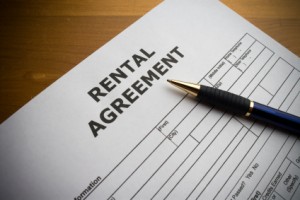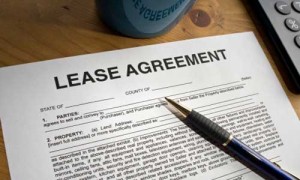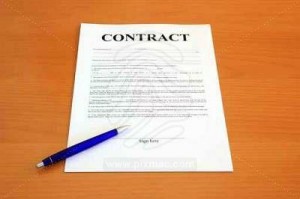Posted by Teresa on August 5, 2013 under Lease and Rental Agreements, Legal | 
 Where do you obtain your leases and other legal documents? Many landlords and property managers download them from the Internet, which is fine—but it’s always best to have a lawyer who is versed in landlord-tenant law look it over before you sign on the dotted line.
Where do you obtain your leases and other legal documents? Many landlords and property managers download them from the Internet, which is fine—but it’s always best to have a lawyer who is versed in landlord-tenant law look it over before you sign on the dotted line.
If you don’t have a lease prepared or approved by a legal professional, you could be setting yourself up for trouble without even realizing it. How? By either not understanding the terms of your lease, or by using one that is not applicable in your state.
We learned recently of a new landlord whose lease terminology bit her in the foot. While she thought that she made it clear that pet deposits were non-refundable, she actually states in the lease that the entire amount she was charging ($500) was completely refundable! Here is the language she used:
“Tenant shall pay to Landlord a pet deposit of five hundred dollars, zero dollars of which shall be non-refundable.”
If zero dollars are non-refundable, then the rest must be refundable, right? In addition, the lease stated that the pet deposit would be used for the purpose of cleaning the carpet. A tenant could argue that if the carpets did not need cleaning upon the termination of the lease, the landlord was not entitled to the funds. There were no other possible uses stated, so the landlord could not use the deposit to repair carpet or flooring, replace moldings, or fix any other items a dog or cat might have damaged.
Unfortunately, the landlord did not realize her mistakes until a tenant with a dog moved out and demanded the entire pet deposit returned. The tenant understood that the entire deposit was, indeed, refundable according to the lease they both signed.
The lesson here is to not only understand the terms of your own lease, but to write the lease in plain English. If you want to charge a non-refundable pet deposit, then say so. Don’t add in conditions or uses for the deposit, such as cleaning carpets.
And finally, seek expert advice on lease questions and other legal matters. It’s worth it in the long run!
Posted by Teresa on July 18, 2013 under Landlord Tips, Lease and Rental Agreements | 
 In Washington and Colorado, voters decided last year that marijuana should no longer be illegal for recreational use. Both states are hammering out rules, regulations and policies to cover this new freedom. But landlords can be stuck in the middle, since pot is still illegal under federal law. Many have added simply added marijuana smoking to their overall smoking bans to keep things simple.
In Washington and Colorado, voters decided last year that marijuana should no longer be illegal for recreational use. Both states are hammering out rules, regulations and policies to cover this new freedom. But landlords can be stuck in the middle, since pot is still illegal under federal law. Many have added simply added marijuana smoking to their overall smoking bans to keep things simple.
But if you don’t live or own rental property in either Washington or Colorado, marijuana is still illegal. And as a landlord, you don’t have to put up with any illegal drug use on your property.
The best way to prevent it is to implement and enforce a zero tolerance drug policy—and to make sure that every applicant and tenant is aware of it. Put it on the lease application and of course, in the lease itself.
Landlords can be at great risk when tenants break the law by using their property for illicit purposes—even if they are completely unaware of it. Hands-on management and close-up monitoring with routine inspections can help you avoid this problem. Of course, you’ll need to give tenants ample notice that you plan to enter the unit, and you certainly can’t snoop through their drawers and closets. So how can you tell if illegal drugs are around?
Many landlords will tell you that their tenants aren’t all that careful when it comes to hiding their drug paraphernalia. Or, you might just catch the odor of marijuana wafting out an open window or through a vent when you’re walking around your property. Keep your ears and the lines of communication open, and you might have other tenants tell you that they’ve seen signs that could indicate drug activity.
When you suspect tenants are using, buying or selling drugs in your rental property, it’s in your best interest to deal with it. If your lease contains a clause that tenants agree to not violate laws, including possession, use, manufacture or sale of illegal drugs, then he or she is violating the lease agreement. Your next move should be to follow your states laws and initiate eviction proceedings.
Evicting over marijuana smoking might seem like evicting over beer drinking, but as long as it’s illegal, you could be open to litigation. It also sends a signal to all tenants that you will always enforce the terms of your lease, 100%. Otherwise, the risk is just too great.
Posted by Teresa on June 28, 2013 under Lease and Rental Agreements, Rents and Deposits | 
 In many areas of the country, rental vacancies are very low; some are at all-time lows. But that’s not the case in every market. If you’re a landlord or property manager with no available units for lease and a waiting list, you don’t need to worry about whether or not to negotiate the rent. But for those of you who have vacancies to fill, should you be considering it?
In many areas of the country, rental vacancies are very low; some are at all-time lows. But that’s not the case in every market. If you’re a landlord or property manager with no available units for lease and a waiting list, you don’t need to worry about whether or not to negotiate the rent. But for those of you who have vacancies to fill, should you be considering it?
Here are some tips for knowing when it might pay to negotiate the rent:
When you’re in a renter’s market. When local economic conditions are such that vacancies are high and demand is low, that’s a renter’s market. Savvy tenants will read the signs: units staying vacant for months, several open units in the same complex or building, and landlords who seem anxious to get a lease signed.
Your tenants moved out months ago. If you have several empty apartment units, or your rental home has been empty for more than a month, it’s probably time to consider negotiating with prospective tenants. Losing a month’s rent for too long can be difficult to make up.
You don’t have other perks or amenities to offer. When attempting to attract new tenants, landlords often waive certain fees or pay for a tenant’s Internet service for several months. If you can’t offer other perks, then rent may be your only place to negotiate and bring a tenant to the table.
You have a high-quality applicant. When you have a tenant who meets your income requirements, passed your tenant screening with flying colors, has a steady job and gets rave reviews from former landlords, it might pay to negotiate on the rent. And if that applicant is willing to sign a long-term lease—such as two years—you might regret not reducing the rent if it’s a deal breaker.
Your unit is overpriced. If your tenant has done her homework, she’ll know what comparable units are going for in your area. If she can walk away and rent another place for less money, you might find it difficult to get a good tenant in your building without matching—or at least coming close to—comparable units.
And don’t forget that in negotiation, you also get to ask for what you want. For example, in exchange for lowering the rent, you might get your tenant to agree to pay before the first of the month, or to pay the first few months up front. You could ask for an 18- or 24-month lease. Or, you could ask the tenant to accelerate his move-in date.
Posted by Teresa on May 24, 2013 under Lease and Rental Agreements, Tenant Credit Checks, Tenant Screening & Background Checks | 

Okay, that’s a trick question. Why? Because your dream applicant shouldn’t “look like” anything in particular: not male, female, black, white, Asian, Catholic, Muslim, American, Russian or any other pre-determined profile. Using a prospective tenant’s race, color, religion, country of origin, gender, family status or disability to either approve or reject him or her for a lease is against the law, after all.
But there are several qualities that most landlords would probably agree make for a dream applicant:
- She can afford the rent: Smart tenants know how much of their take-home salary should go to their rent, utilities, car payment and other bills each month. Dream tenants only apply for rental housing they can afford.
- He has stable employment: A dream applicant is proud to present his employment history, because it shows he’s stable enough to hold down a job for longer than a month.
- She doesn’t balk at the tenant screening process: These days, smart tenants know that they will probably undergo tenant screening. And they appreciate the fact that you care enough about who lives in your rental property to require background checks for all tenants.
- He has a good credit history: The dream tenant has never been evicted, pays his bills on time and lives within his means. He’s not overextended on credit, is not going to have his car repossessed, and will most likely pay his rent on time each month. And, if his credit history is less than stellar, he has a co-signer lined up.
- She has great references: When you call a dream applicant’s former landlords and personal references, they all say good things. And they’re not her friends, co-workers or parents who are pretending to be former landlords!
Remember not to judge a prospective tenant by anything other than their ability to pay the rent and security deposit, and pass a background and credit check. And if you’re lucky, you’ll land a dream applicant who becomes a dream tenant!
Start your tenant relationship off right by knowing who you’re leasing to. Protect your rental property and assets with tenant background checks. Proper tenant screening will ensure you are leasing to the best possible tenants.
Posted by Teresa on March 10, 2013 under Lease and Rental Agreements, Tenant Screening & Background Checks | 
 Landlords typically include language in the lease that prohibits subleasing without permission. But what exactly is subleasing, when and why would a tenant want to do it, and how should landlords proceed?
Landlords typically include language in the lease that prohibits subleasing without permission. But what exactly is subleasing, when and why would a tenant want to do it, and how should landlords proceed?
Subleasing is different from transferring a lease to another party. In the latter situation, another tenant takes over a current lease and the original tenant is absolved of any responsibility for its terms.
In subletting, the subtenant is granted the rights contained in a sublease, but the original tenant is still responsible for the terms of the original lease. In essence, the subtenant is renting from the original tenant, who is still bound by the contract with the landlord. For example, a subtenant is allowed to live in the unit but must pay rent. If they do not, the original tenant is still liable for the missed rent.
Tenants might be interested in subleasing if they are going away for an extended length of time, but wish to return to their apartment. It wouldn’t make sense to go to the trouble of subleasing for a trip of a few weeks. But if your tenant were planning on traveling through Europe or South America for three months, subleasing is a way to cover the rent without having to break the lease and start over when they return.
Tenants who are interested in subleasing may ask permission, even if the lease states you do not allow it. Remember, it’s always up to the landlord whether or not to allow the sublease. If you decide to allow a tenant to sublease your property, follow these tips for a more successful outcome:
- Write up a Consent to Sublease agreement between yourself or your company and the two parties.
- Include elements such as effective date, the tenant and subtenant’s names, the property address, and the monthly rent.
- Be sure to state that the tenant is still responsible for his or her duties under the original lease.
- If you decide to allow subleases, be sure to create a policy. Don’t let one tenant sublease, and forbid another from subleasing. This could lead to charges of discrimination.
- Be sure your tenant also has a sublease agreement with the subtenant. This is a different document from your Consent to Sublease agreement, and covers the legalities between those two parties. If expectations are not made clear, you could find yourself stuck in the middle of their disagreements.
- Keep in mind that if the subtenant damages the unit, leaves before the lease expires or breaks any other condition of the lease, you may hold the original tenant responsible. He or she can will have to get satisfaction from the subtenant.
- Just as you screen all your prospective tenants before signing a lease, you should make it clear that any subtenants will also be required to undergo tenant screening.
Subleasing can be a hassle, but if you have good tenants whom you want to keep, allowing them to sublet while they’re away can make sense. Remember, it’s completely up to you!
Start your tenant relationship off right by knowing who you’re leasing to. Protect your rental property and assets with tenant background checks. Proper tenant screening will ensure you are leasing to the best possible tenants.
Posted by Teresa on February 22, 2013 under Landlord Tips, Lease and Rental Agreements | 
 Experienced landlords know: anything can happen in the rental business. Natural disasters strike, vandals damage property, fires break out and thieves are everywhere.
Experienced landlords know: anything can happen in the rental business. Natural disasters strike, vandals damage property, fires break out and thieves are everywhere.
Of course, rental property owners carry insurance protection on their properties to protect themselves from liability and loss. Most policies cover damages and accidents that occur on the property, but not the tenants’ possessions.
Tenant’s insurance, or renter’s insurance, covers personal property in a rental home or apartment against fire, theft, water damage (but not flooding) and vandalism. It also protects tenants in the event that someone is injured in their unit.
It’s a good idea for tenants to buy an insurance policy, but can landlords require it? Absolutely! In fact, many do and for good reasons:
- Tenants with renter’s insurance will be less likely to try to sue the landlord in the event of a loss or injury, since they have their own coverage.
- Renter’s insurance can protect rental property from tenants’ misuse or negligence. For example, if a tenant floods the unit, his or her insurance will pay for the cleanup. Those without renter’s insurance could just move out and leave the mess for the landlord to deal with.
- Having tenants with their own insurance can help landlords avoid claims on their own policies.
- Renter’s insurance can protect tenants and landlords against claims in case of dog bites from tenants’ pets. The renter’s policy can cover the claim, so the injured party is less likely to sue the landlord.
- The peace of mind in knowing your tenants are covered in case of a fire or other disaster can be worth its weight in gold. Insurance proceeds can replace clothing, furniture and other necessities, as well as pay for living expenses in case tenants have to temporarily relocate.
If you do require renter’s insurance, make sure it is clearly explained in the lease agreement. It’s also a good idea to be named as a secondary insured, so you can be notified of lapses in coverage.
The cost of renter’s insurance is often less than $20 per month. If you have prospective tenants who balk at the insurance requirement, perhaps they are not qualified to live in your properties!
Posted by Teresa on February 15, 2013 under Eviction, Lease and Rental Agreements | 
 Even in a good rental market, it’s important to hold onto good tenants. What defines a “good tenant?” Well, nobody’s perfect, but if your tenant pays the rent on time, follows your rules and doesn’t cause any problems, that’s pretty close!
Even in a good rental market, it’s important to hold onto good tenants. What defines a “good tenant?” Well, nobody’s perfect, but if your tenant pays the rent on time, follows your rules and doesn’t cause any problems, that’s pretty close!
But good tenants sometimes fall short, and it can be tempting to draw the line and get rid of them in favor of an even better tenant. Or you might just cross your fingers and hope they move at the end of the lease.
Unless a tenant is breaking the terms of the lease by paying rent late, keeping pets that aren’t allowed, smoking or making too much noise (or any of the long list of grievances landlords have against their tenants), it might be worth your while to let them stay or to entice them to renew their lease.
Keeping good tenants is just good business. Turnover costs money. When a unit is empty, it creates no income. In the meantime, you still have associated overhead costs. Taxes, mortgage expense, lawn service and interest will go on after the tenant leaves. It might not take long to get a new tenant, but then again, it could be a month, two months or longer.
Getting new tenants costs money, too. You’ll need to clean the unit, have the carpets professionally cleaned, touch up the paint (or do a complete repaint) and do all the necessary repairs. Plus, you’ll need to advertise the rental, conduct tenant screening on applicants, and take the time to show the unit.
Empty units look bad to existing and potential tenants. Your other tenants may wonder why others are leaving. Prospects may see “for rent” signs in front of your property too frequently and wonder what’s wrong.
On the other hand, stable tenants mean a stable property. Stability is very valuable in the long run, both financially and in terms of landlord sanity!
While no landlord or property manager should ever allow tenants to pay the rent late, break the terms of the lease or walk all over you, good tenants are worth keeping.
Start your tenant relationship off right by knowing who you’re leasing to. Protect your rental property and assets with tenant background checks. Proper tenant screening will ensure you are leasing to the best possible tenants.
Posted by Teresa on December 21, 2012 under Landlord Tips, Lease and Rental Agreements | 
 Our last post was about whether or not allowing tenants to do their own repairs is a good idea (we say, “not”). We’ve also heard about landlords who won’t allow tenants to perform their own repairs, but require them to be present while the repairs are being done.
Our last post was about whether or not allowing tenants to do their own repairs is a good idea (we say, “not”). We’ve also heard about landlords who won’t allow tenants to perform their own repairs, but require them to be present while the repairs are being done.
Of course, a tenant with a leaking dishwasher would need to be notified of the day and time the plumber is coming by. But it’s not the tenant’s responsibility to stick around to let the plumber in and to lock up when he or she leaves.
That’s the landlord or property manager’s job. It’s generally understood that the landlord, building superintendent or property manager is the go-to person when maintenance and repair people need to work on rental units. Sure, it’s convenient if the tenant is at home and can be stick around while the repairs are being done. But think about the liability issues at stake here. Having strangers entering your rental units could potentially put your tenants and their families at risk of harm. You may have no reason to mistrust your contractors, but anything can happen.
Even if your plumber or electrician is the most upstanding person in the community, some people just want to make trouble. It’s possible that a disgruntled tenant could “invent” an issue – and you could have a lawsuit on your hands. Without a witness, it becomes a case of the tenant’s word against the contractor’s word.
It might be convenient to require a tenant to be at home when repairs are being made, but it could also lead to more trouble than you bargained for. It’s better to keep things professional, and handle contractor visits yourself or with the help of your property manager.
Posted by Teresa on November 7, 2012 under Landlord and Tenant FAQs, Lease and Rental Agreements | 
 A landlord recently asked if her tenant, who claimed her roommate had abused her, would be allowed to break her lease.
A landlord recently asked if her tenant, who claimed her roommate had abused her, would be allowed to break her lease.
Good question! Many abuse victims do not feel safe in their homes, even with protective orders against their abusers. Others, as in the case above, actually live with their abusers. In either case, the desire to move can be strong—even if it means breaking a lease. Should victims of domestic abuse be allowed to get out of a lease before it is up? Should penalties be waived? And who should carry the financial burden, the tenant, his or her roommates, or the landlord?
The first thing a landlord should do is to check state laws, and if applicable, any local statutes that cover domestic abuse and tenant rights. Under most landlord-tenant laws, the tenant cannot be excused from paying rent when he or she breaks a lease before it expires. In some places, the landlord is not required to re-lease the unit, and the tenant is responsible for rent until the end of the lease. In others, the landlord has a duty to attempt to re-lease the rental unit.
Many states have passed legislation giving domestic abuse victims the right to break a lease without penalty or paying future rent. They include New York, New Jersey, Oregon, Washington, Minnesota, North Carolina and others. Check your state’s landlord-tenant laws to determine whether it has passed such legislation. Many require the victim to notify the landlord of intention to terminate the lease. The required notice may be 30 or 60 days. Some require proof of abuse, such as a protective order or police report.
Most landlords realize that having a domestic violence situation on their property is not good. But it’s also true that tenants who move out before their leases are up cause financial hardships. Certain states make it easier on the landlord by requiring the vacating tenant to pay rent for the month in which they leave. In others, they are required to pay two months’ rent.
If you receive such a notice from a tenant, check your states law and proceed accordingly.
Posted by Teresa on October 30, 2012 under Landlord Tips, Lease and Rental Agreements, Legal | 

Landlords and property managers have the right to enter their properties, with proper notice to their tenants. Whether it’s for routine maintenance work, pest treatments or safety inspections, it’s not only necessary to occasionally enter a tenant’s unit, but it’s a good idea to do so. You need to know what’s going on in your properties.
During these routine inspections, landlords and property managers sometimes see things that tenants don’t intend for you to see, such as:
- Ashtrays, cigarette butts and lighters.
- Pet supplies, like food dishes and litter boxes.
- Drug paraphernalia like pipes, lighters and syringes.
- Illegal drugs, such as marijuana or cocaine.
- Evidence of drug manufacturing.
- Signs of a business being run out of the unit.
What can (and should) you do when this happens? Can you evict the tenant? If the occupant is otherwise a good tenant, should you ignore it? First, it’s always important to be familiar with your state’s laws regarding grounds for eviction. But if any of the activity you have witnessed violates the terms of your lease, you probably do have grounds for eviction.
If you’d rather not go that route, then it’s possible to wait until lease renewal time comes around, and inform the tenant that the lease will not be renewed. Of course, you’ll need to provide proper notice, according to the terms of the lease.
Reasons to Consider Eviction or Non-Renewal of a Lease
- Liability: Landlords can be liable for criminal activity that occurs on their properties—even if they are not aware of it. Landlords can be liable for injuries that occur as a result of illegal activity. Landlords can be liable for injuries caused by a tenant’s pet—even if they are not aware of the pet. Laws vary from state to state, but why take chances?
- Health: Smoking in units where it is not allowed can affect other residents, including children. Second-hand smoke carries chemicals and carcinogens through vents, doorways and windows. In addition, cigarettes are the cause of accidental fires.
- Safety: Each year, almost 1,000 smokers and non-smokers are killed in fires caused by cigarettes and other smoking materials.
- Fairness: If most tenants follow your rules, such as not running a business out of the rental unit, it’s not fair to make exceptions for someone who ignores the lease. Charges of discrimination could follow.
Strict and equitable enforcement of rental agreements should be every landlord and property manager’s practice. If tenants are conducting illegal or criminal activities or are breaking the terms of their leases, your best move is to get them out and replace them with tenants who will follow the rules and abide by the lease.
And if you need to, amend your lease agreement to include a paragraph prohibiting drugs and other illegal activities on your property.
Start your tenant relationship off right by knowing who you’re leasing to. Protect your rental property and assets with tenant background checks. Proper tenant screening will ensure you are leasing to the best possible tenants.
 Where do you obtain your leases and other legal documents? Many landlords and property managers download them from the Internet, which is fine—but it’s always best to have a lawyer who is versed in landlord-tenant law look it over before you sign on the dotted line.
Where do you obtain your leases and other legal documents? Many landlords and property managers download them from the Internet, which is fine—but it’s always best to have a lawyer who is versed in landlord-tenant law look it over before you sign on the dotted line.






